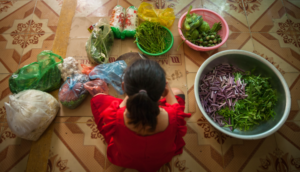India and COVID-19 Response
The last couple of weeks have clearly shown the inequity in the global COVID response. On the one hand, the UK is contemplating opening up foreign travel amidst reports that over 50% of adults have now had a first dose of the vaccine. On the other, India is confronting the catastrophic reality of its health service being overwhelmed by over 350,000 new cases per day, with patients being turned away from hospitals due to lack of oxygen supplies.
Business Fights Poverty have joined forces with a coalition of business networks, charities and other organisations to launch our India and COVID Response to help address immediate needs for oxygen-related equipment and medicines, as well as the longer-term need for preventative health and hygiene measures. The coalition came together in a matter of days, to coordinate collective action.
We are putting out an urgent Call to Action across our community. To find out more:
- Read Zahid Torres-Rahman’s article on how the coalition formed, its immediate priorities, and how you can get involved.
- Register here to connect with us., particularly if your organisation can help with supply, logistics, funding, knowledge and/or networks.
Learning from the COVID-19 Response to Date
Of course, in the response to the latest COVID-19 crisis, organisations can draw from the many lessons that have been learned over the past year. Several of our recent articles highlight resources that are available, as well as examples of best practice:
- In Business and COVID-19 One Year On, Zahid and Yvette Torres-Rahman Founders, Business Fights Poverty reflect on a year of the Business Fights Poverty Respond, Recover and Rebuild Better Centre, which offers a wealth of resources to guide business’ response to COVID-19.
- Find out How some companies are responding to the crisis in a meaningful way, according to the World Benchmarking Alliance’s recent COVID-19 and Human Rights Study. The most startling finding, for me, was that only 6% of the companies consulted with workers, communities and vulnerable groups to identify and assess COVID-19 risks and impacts. The article highlights some positive exceptions, underlining the value in listening to all key stakeholders.
- The Kenyan flower industry has been badly hit by COVID-19, with exports severely affected by reductions in air freight. Jeroen van der Hulst, Owner and Founder, FlowerWatch, explains how a partnership with the Vulnerable Supply Chains Facility – a rapid COVID-19 response funded by the UK Foreign, Commonwealth and Development Office – is protecting jobs and boosting supply chain resilience.
Climate Justice
Meanwhile, our work on Business and Climate Justice continues, and our content has reflected the importance of this topic across the Business Fights Poverty community:
- Vaughan Lindsay, CEO of ClimateCare provides a much-needed glimmer of hope in his article, Why 2021 presents an opportunity to build back better and take action on big societal issues like climate change. 2020 was a year that caused many to raise their ambitions on climate change; but what really counts, is action.
- In New skills for a shifting climate, Practical Action share an ‘ingenious five point plan’ to equip agrarian communities in Nepal with skills, knowledge and access to markets that will boost their resilience to climate change.
- In a similar vein, Amy Bracken, Acceso, provides insight into their work Growing Haiti’s food systems with determination and partners. She shares a success story that shows the power of coalitions to make positive change, even in the most challenging times.
- Texas, Climate and Equity presents an Interview with Bridgette Murray, ACTS Founder and Tides Network WE LEAD Grantee. Bridgette explains how her work supports community-based solutions to the climate crisis, drawing from the knowledge of those who are most affected.
- And don’t miss our podcast with Dr Tara Shine, Co-founder and Director of Change by Degrees, and former international climate change negotiator and adviser to governments & world leaders on environment and development policy. The conversation ranges from how businesses can put people at the centre of climate action, the actions we can all take to inspire change, and top trends to watch.
Inclusive Business
A key component of climate justice is the growing shift to more inclusive models of business. Over the last few weeks, several of our articles have addressed this theme, asking how companies can accelerate inclusion even in these times of crisis. Our contributors believe it can and must be done. Furthermore, they highlight the value for business in embracing the perspectives and leadership of marginalised groups.
- In Young leaders offer wisdom for the road ahead, Shafat Khan, Ashoka, makes the case for young people being respected as leaders, decision-makers, and active participants in solving the problems that we all face.
- Could social metrics help us move towards a sustainable future that works for everyone? Explore WBA’s new Social Transformation Framework with Sofía del Valle, Engagement Manager at the World Benchmarking Alliance. This new framework focuses on three key areas for building an inclusive business: human rights, decent work, and ethical conduct.
- Is inclusive growth possible now, in times of socio-economic crisis? Mónica Gil-Casares, Director of Research, Social Innovation and Consulting, CODESPA Foundation, shares the results of a study into this question, by the Business Roundtable for Inclusive Growth, Fundación CODESPA and a group of Spanish companies. She also introduces a pilot project called Prosper4ALL, which identifies four major dimensions for measuring business contribution to inclusive growth.
- In the The Time Is Now: Accelerating the Business for Impact Movement Jeanine Buzali, Changemaker Companies sets out a challenge for thriving companies to ‘redefine value creation and how businesses “net out” their impact.’ Creating positive social and environmental impact at scale results from empowering people at all levels to become ‘changemakers’ through the work they do daily.
Upcoming Events for Your Diary
Finally, we have several live online events in the diary, designed to help you engage, learn, connect and partner on key areas of interest to our community:
- 26 May 2021: Virtual Rebuild Better Summit on Partnerships, exploring how multinational businesses can deepen relationships across their value chains, support vulnerable communities, and improve sustainability and resilience for all.
- 9 June 2021: Global Intrapreneur Week, Business Fights Poverty enquiry session, deepening understanding about how business can put people at the centre of climate action.
- 21-25 June 2021: Rebuild Better Global Summit. Themes for this five-day event will include Business Leadership, Gender Equity, Livelihoods, Climate Justice and Partnerships.
- 13-15 July 2021: Summit on Developing Skills for the Future, partnering with Standard Chartered for their Futuremakers Forum 2021. This year’s Forum creates spaces for young people and business decision makers to connect; explore skills needed for the real jobs of tomorrow; and provide practical advice sessions both for businesses to support young people and also for young people to counsel business decision makers on the future of talent. Registration for the event will be via SC.com in early June. Watch this space!
Please click on the links to register and watch out for further updates.










